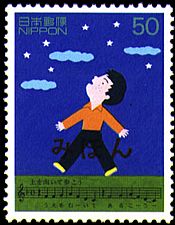Four your consideration, 62 (now 118) YouTube videos of “the Sukiyaki song,” actually Ue o Muite Aruko?,” or “I Look Up As I Walk,” originally sung by Japanese pop singer Kyu Sakamoto.
 I first remember Japan’s only #1 international pop hit ever, called Sukiyaki in the West, as my brother’s “favorite song.” He does not, I suspect, share that recollection, but it quickly became my own favorite song back in 1963, listening on a tinny transistor radio, itself a Japanese product.
I first remember Japan’s only #1 international pop hit ever, called Sukiyaki in the West, as my brother’s “favorite song.” He does not, I suspect, share that recollection, but it quickly became my own favorite song back in 1963, listening on a tinny transistor radio, itself a Japanese product.
It’s not clear who exactly attached the name Sukiyaki to the song for English-language purposes, but the logic seems clear: Use a word that a typical American listener would recognize as Japanese. The absurdity is clearer: Use a title meaning “beef stew” for what all understand to be a sadly romantic love song. But it stuck, and was even incorporated into the lyrics for some European versions.
Once the song ran its course on the U.S. top 40, years went by without my hearing it. This was before ubiquitous oldies stations, and later the Internet (not to mention my own record collecting), made it easy to hear the song on demand. But it was always one of the sweetest tunes I knew and never failed to raise a smile.
It’s no less joyful to hear today, one reason that musicians around the world have chosen to record the song in dozens of styles: pop, folk, jazz, reggae, a cappella, metal, boy band, glee club and more — all available on YouTube. These performers throw their heart and their multiplicity of voices and languages into this simple but supremely lovely melody.
The sweetness is a function not just of the tune, but also the original Japanese words, essentially, “I look up as I walk so that the tears won’t fall.” (Different from the much later English version concocted by Taste of Honey, which has its own virtues.)
Although the poignant heartbreak is almost universally interpreted as romantic, according to Wikipedia the song was originally written as a political lament.
“Rokusuke Ei wrote this song while coming back from a protest against the Treaty of Mutual Cooperation and Security between the United States and Japan and feeling dejected about the failure of the protest movement, but the lyrics were rendered purposefully generic so that they might refer to any lost love.”
Several sets of lyrics have been put into circulation over the years: Ei’s Japanese original, some straightforward translations from the Japanese, Taste of Honey’s more conventional love song of 1980 and some European adaptations that introduce references to Nagasaki along with “Sukiyaki” as the name of a character.
The video performances range from earnest to absurd. A version featuring a Dutch group named “Asia” is among the most ridiculous music videos ever. Another favorite is the Spanish-language entry from Los Doltons. Weird in its own way, but harmlessly so compared with Asia’s.
Among the videos here is Sakamoto’s own rather mannered television performance of 1984, not long before his death in a 1985 plane crash that was the deadliest single-aircraft accident in history.

thank you for posting this, it’s one of my very favorite songs. for years &, you know, years too.
were it not for the heepster girl who shows up too soon afterwards, i’d now be able to sing it phonetically.
—
ps. i just found yr blog, i really like it. of all odd things, i think i found it thru nancy. i have no idea why i’d suddenly found nancy, however.
pps. i cant call them hipsters, i cant. hipsters is what my parents were, way back before this one [& all the ones like her] were a splinter in the eye of their [now hated] boomer grandparents. you know: beats, folk, trouble. not this. not hardly.
thank you for posting this, it’s one of my very favorite songs. for years &, you know, years too.
were it not for the heepster girl who shows up too soon afterwards, i’d now be able to sing it phonetically.
—
ps. i just found yr blog, i really like it. of all odd things, i think i found it thru nancy. i have no idea why i’d suddenly found nancy, however.
pps. i cant call them hipsters, i cant. hipsters is what my parents were, way back before this one [& all the ones like her] were a splinter in the eye of their [now hated] boomer grandparents. you know: beats, folk, communism, freud, trouble. not this. not hardly.
—
way pps. apologies if this posted twice, it told me it hadnt posted the first one. you are welcome to discard it–or both. i mean, it’s yr blog.
A song for the ages; yes I meant ages not for us aged, that too.
This was a worldwide hit….Don’t make like this anymore….